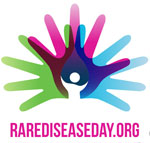By Hemali Bedi
Rare diseases affect one in 2000 people or less; [1] but, rare diseases are more than just a  medical challenge. Together, they present a public health problem that affects approximately 400 million people worldwide. [1]
medical challenge. Together, they present a public health problem that affects approximately 400 million people worldwide. [1]
February 29th marks the ninth annual Rare Disease Day, which is co-ordinated by EURORDIS. [2] With the aim of raising awareness for rare diseases, this day is celebrated by health care professionals, researchers, patients, carers and policy makers in over 80 countries across the world. [2]
People all over the world are affected by rare diseases, which make them an important global health issue. [1] The causes of most rare diseases remain unknown. [1] The challenges of living with a rare disease often include a lack of medical knowledge about the condition, delayed diagnosis and inequitable access to health care. [1] Some of these factors are listed in a recent Global Health case report by Sundram et al, which focuses on a rare congenital disorder known as Cloacal dysgenesis sequence.
At BMJ Case Reports, we are interested in Global Health case reports that focus on all the causes of ill health and access to healthcare services, whether economic, social or political – global health issues as they impact on individual patient’s lives.
With this in mind, what else can be done to raise awareness of rare diseases and promote them as an international public health priority?
References
[1] The World Health Organization. Priority Medicines for Europe and the World “A Public Health Approach to Innovation” Update on 2004 Background Paper. www.who.int/medicines/areas/priority_medicines/BP6_19Rare.pdf
[2] What is Rare Disease Day? Rare Disease UK. www.rarediseaseday.org/article/what-is-rare-disease-day, accessed 22 February 2016